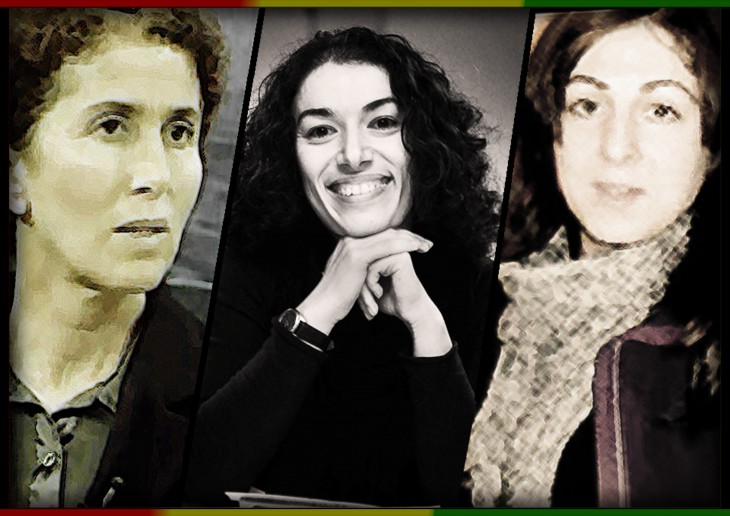ANF, FERDA ÇETIN — The killings in Paris of Sakine Cansız, Fidan Doğan and Leyla Şaylemez have more known sides than the unknown, the latest being summed up by the question “who pulled the trigger”. When dealing with these type of actions, keeping the focus constantly on the “unknown side” and trying to add mystery to mystery is a common tactic adopted to ignore the “known and clear” sides.
The majority of comments associated the murders to a provocation against the recently started Turkish-Kurdish negotiations. Behind the killings, goes the discourse, stand dark powers that do not want an end to the ongoing war in Turkey and therefore intend to leave the Turkish government and the PKK in a difficult situation when negotiations are just about to begin.
But these killings didn’t send a message to Öcalan and the PKK, while at the same time sending a message to Erdoğan and the state, so to hit both along the same lines. The message has been sent to one side: to Öcalan, to PKK and to the Kurdish people. The “sadness of” Arınç (deputy PM) and some columnists is not the feeling fellow Turkish side felt. The joy of Erdoğan, the Fethullah Gulen circle and the media is a feeling which translates into “our interlocutors should not feel safe anywhere”.
It is not difficult to see all this.
Those who planned these killings assume that negotiation will be much easier if one party to such negotiation is striving for its own life, because security of life will in that case become an issue of first priority, even more important than political demands. In line with this way of thinking, we are witnessing a remarkable increase in aerial strikes against guerrilla areas since the beginning of the process of talks with the Kurdish leader. The murder of Sakine Cansız, Fidan Doğan and Leyla Şaylemez aims at showing that the attacks target not only guerrilla areas but also the European area where Kurds are carrying out many political activities.
It is a known fact that the Turkish state has made dozens of attempts so far to kill the leading members of the PKK. The state considers this a “legitimate” right of its. Erdoğan’s words “they will not be comfortable in their caves, and wherever they are” well reflect this discourse. The Islamist-pro-Turkic mentality can only undergo a change when it understands that the killing of Kurdish politicians and commanders will cost them a lot…
It is here when the U.S. come into play. It is the U.S. that has been inspiring Turkey to “try again, you will win this time”, every time the Turkish state was defeated by the guerrilla fight for thirty years. Francis Ricciardone, the U.S. Ambassador to Ankara, held a meeting with Ankara representatives of TV channels on 16 September 2012. During the meeting, Ricciardone said, we suggested Turkey to follow “Bin Laden” tactics against PKK leaders, but Turkey didn’t approve the proposal.
So what is the “Bin Laden” tactics?
It is the way in which what has been done in Paris with a 7.65 mm weapon is done with herons, helicopters, execution teams and bombs, and called “captured dead”.
Two days after the Paris killings, Victoria Nuland, spokesperson for the U.S. Department of State said in a statement on 11 January that the U.S. “see the İmralı talks as a positive development in general terms”. Nuland, who ends every speech by condemning “terror”, for some reason did not condemn the terrorist action in Paris. Was these murders not a terrorist action? Or, were the three women slaughtered the kind of people who deserved to be killed with “Bin Laden tactics”? Is the involvement of the U.S.-born Turkish Gladio the reason why the U.S. passed over the murders?
In our opinion, it is… The U.S., a power openly providing support to military dictatorships and despotic governments in different territories around the world, excuses and supports state terror in its foreign policy as well.
The U.S. has put no proposal forward so far for the solution of the Kurdish issue through dialogue. In its relations with the four exploitative states, it always considered the Kurdish people as an instrument to be used. It accused the fair and legitimate struggle of Kurd of “terrorism” in its monthly statements.
The Turkish Gladio would never commit such a murder and the Turkish intelligence service have never carried out an action abroad since the operations against the Armenian Asala organization in 1982, they say… Is that so?
The Turkish state committed two known murders abroad in 1998.
On 17 November 1998, in the days when Kurdish leader Öcalan left Syria, Russian State Duma deputy Galina Starovoitova was gunned down in the entry hall of the apartment building she lived in. Starovoitova was the leading politician asking for political status for Öcalan.
Who and which countries did not want Öcalan to have political status?
Clearly, the Turkish Republic and the U.S.
One week later, the second murder was committed in Iran on 21 November 1998. The former Iranian Minister of Labour Dariush Forouhar and his wife Pervaneh were shot dead. Just several days before the armed attack, Forouhar appealed to the Iranian government and asked permission for a meeting for Öcalan. His appeal was confirmed by the Iranian government. Turkish papers reported the killings as an “intimidation to Italy”. The perpetrators of both killings remain unknown as Russia and Iran both passed the incidents off.
The Iranian intelligence service killed dozens of its opponents in Turkey at different times so far. Russia has also murdered a Chechen leader in Zeytinburnu in a not too distant past. So it means that intelligence services have some “reciprocity agreements”, a sort of “you don’t see mine and I don’t see yours”… The French state and intelligence service have yet to determine the perpetrators but it is explicit that they already know which intelligence service has committed the murders.
FERDA ÇETIN
ANF NEWS AGENCY
(en.firatnews.com)
